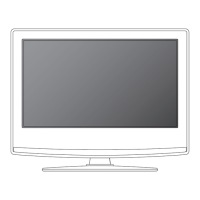
Do you have a question about the Blaupunkt 32/138O-GB-11B4-EGP and is the answer not in the manual?
Read all safety and operating instructions before using the appliance to prevent hazards.
Avoid placing the TV on unstable furniture to prevent tipping and serious injury, especially to children.
Follow guidelines for safe operation, including proper ventilation, avoiding liquids, and using approved accessories.
Clean the TV with a soft, dry cloth; avoid alcohol or harsh chemicals. Handle liquid spills carefully.
Save original packaging for safe transport, warranty, or service repairs.
Limit static images and adjust brightness/contrast to prevent permanent screen burn-in.
Dispose of the TV and components responsibly at designated recycling points.
Handle batteries with care, observe polarity, do not mix types, and dispose of them environmentally.
Lists registered trademarks for HDMI, HDTV, DVB, and JBL, indicating their ownership.
Warns that the unit is a Class 1 Laser Product and advises against improper use to avoid radiation exposure.
Lists all accessories supplied with the TV, including user guides, remote, cables, and stand parts.
Step-by-step guide on how to attach the TV stand feet using screws.
Instructions on how to safely remove the TV stand feet by unscrewing them.
Recommends fitting anti-tip straps for maximum security to prevent the TV from tipping over.
Provides instructions and safety notes for securely mounting the TV to a wall, including screw usage.
Explains the function of basic buttons like STANDBY, MUTE, DTV, RADIO, USB, and DVD source selection.
Details how to use the MENU, SOURCE, OK, EXIT, and directional buttons for navigation.
Describes buttons for playback (play, pause, rewind, fast forward) and special functions like aspect ratio and subtitles.
Indicates features specific to models with integrated DVD players, PVR, or USB playback capabilities.
Explains how to operate TV functions using the control stick located on the back of the TV.
Guides users on how to switch between different input sources like TV, HDMI, AV, etc.
Details the specific buttons on the TV for controlling DVD playback functions.
Describes the Earphone, Ethernet, and Digital Optical Audio output ports and their functions.
Details the SCART, HDMI 1, HDMI 2, HDMI 3, AV IN, and YPbPr IN ports for video connections.
Covers the USB and CI CARD IN ports, explaining their respective uses for data and common interface modules.
Explains how to connect devices using Composite AV/Video output, including cable types and source settings.
Illustrates how to connect devices via a SCART cable and set the TV source accordingly.
Details how to connect devices using HDMI for high-quality digital video and audio transmission.
Guides on connecting devices using Component/YPbPr cables for picture and separate audio cables.
Explains how to connect external audio devices like amplifiers using the headphone or optical outputs.
Describes the use of the Ethernet port for Freeview HD services and network connectivity.
Details how to adjust picture settings like Picture Mode, Contrast, Brightness, Colour, and Sharpness.
Explains different aspect ratio options like Auto, Original, Full Screen, 16:9, and 4:3 for optimal viewing.
Describes the Noise Reduction feature to filter and reduce picture interference.
Explains the Active Contrast feature for optimizing backlight and contrast based on screen brightness.
Covers sound adjustments including Sound Mode presets, Treble, Bass, Balance, AVL, and DTS TruSurround.
Options for digital audio output: Off, Auto, and PCM for connecting to stereo Hi-fi systems.
Allows adjustment of Audio Description volume for visually impaired users.
Enables adjustment of audio delay to sync audio with video for external speakers.
Details channel tuning (Auto, Manual), channel editing, and signal information viewing.
Options for locking menus, changing passwords, channel locks, parental guidance, and button locks.
Features for setting Auto Sync, Clock, Off/On Timers, Sleep Timer, OSD Timer, Auto standby, and Time Zone.
Adjustments for Language, Audio, Subtitles, Hearing Impaired, Blue Screen, First Time Installation, Reset, Software Update, HDMI CEC, Network, LED, and Version info.
Guides on configuring network settings via IP Config (Auto/Manual), Network Info, and Network Test.
Configure TV display formats, speaker output, dual mono, and dynamic range for DVD playback.
Select the appropriate TV system (PAL, NTSC) and reset DVD setup options to defaults.
Explains how to navigate and use the 7-day TV guide to view program information and set reminders.
Guides on how to display and browse the list of available TV channels.
Instructions on how to browse files (Photo, Music, Movie, Text) on a connected USB storage device.
Details how to control media playback using the remote control buttons or on-screen interface.
Explains the TV's USB recording capability for Freeview/Saorview, including pause, fast forward, and rewind.
Describes time shift functionality and how to record programs instantly or access recorded files.
Instructions for connecting the TV to a Sky box via SCART or HDMI, including remote control programming.
Explains how to use a Sky remote or a universal remote to control TV functions.
Addresses common user queries regarding sound, menu options, and auto-standby settings.
Covers FAQs on USB device recognition, recording issues, DVD playback, and Freeview channel access.
Provides essential product specifications like model ID, screen size, power consumption, and resolution.
Lists RF, input/output details, speaker wattage, voltage, dimensions, weight, and wall mounting compatibility.
Details the video, audio, photo, and subtitle file formats compatible with the TV's USB media player.